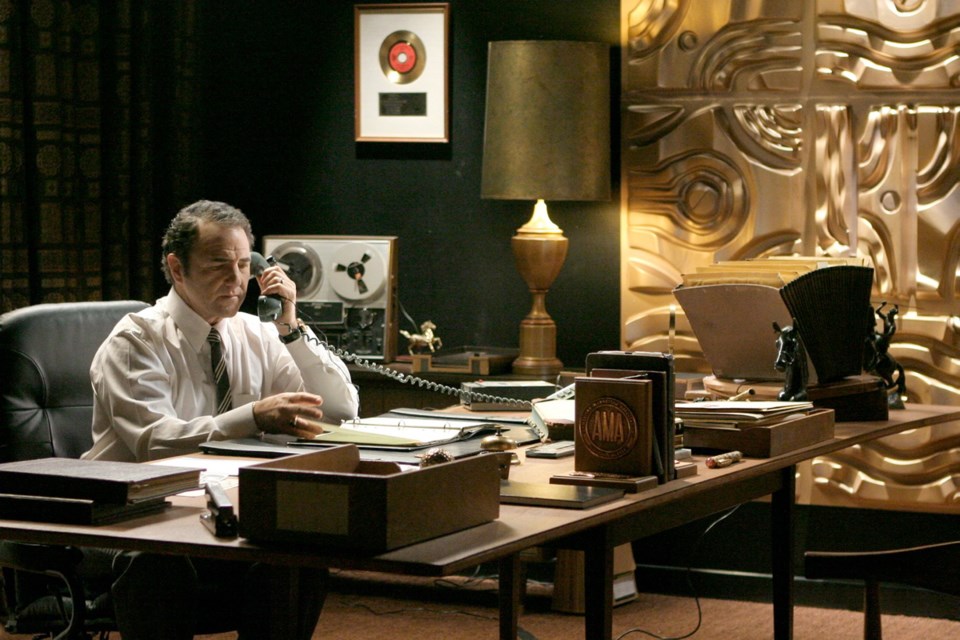My Father and the Man in Black
When: Feb. 9, 4:30 p.m.
Where: Empire Capitol 6
Rating: Four stars
----------------------------
When Jonathan Holiff’s painfully personal documentary My Father and the Man in Black premières tonight at the Victoria Film Festival, he’ll be another step closer to revealing what he jokingly terms “the best-kept show-business secret in Canada.”
Holiff’s inside story of his search for his late, emotionally distant father Saul Holiff, who managed Johnny Cash from 1960 until 1973, and how the son finally came to terms with the father after living in the shadow of a legend, is on a roll globally.
Most recently, his intimate portrait of Cash during that era was acquired by Wide House for a theatrical release in the U.K.
My Father and the Man in Black has already played at a dozen festivals from Edinburgh to Hamburg, garnering awards and critical acclaim, with more dates to come in Ireland, New Zealand and the U.S. And while it was an audience favourite at festivals in Vancouver and Calgary, the film, to his bewilderment, hasn’t yet been picked up for theatrical release in Canada.
“I can’t help but be disappointed by that,” says Holiff, whose project was financed through friends and family. “Ninety-nine per cent of people have no idea how much of Johnny’s story took place in Canada.”
The country music icon proposed to June Carter during a concert in 1968 at Treasure Island Gardens in London, Ont., Saul’s hometown. He owned a drive-in burger joint there and that’s where he first booked Cash for a gig. It was Saul who originally suggested booking June Carter for the Big D Jamboree in Dallas; and who did damage control when his famous client initially appeared to have died in Toronto after he overdosed and was found unconscious in his motorhome the morning after performing at O’Keefe Centre in 1966. “For all intents and purposes he was dead,” Saul noted in his audio diary. (Cash didn’t die, however, until 2003 after complications from diabetes in Nashville, Tennessee.)
And it was in Nanaimo that Saul, years after resuming his studies at the University of Victoria, took his own life at age 80 in 2005, prompting his estranged son to abandon his Hollywood career to drive home and comfort his mother, Barbara. It was at her suggestion, following his subsequent discovery of his father’s secret storage locker loaded with rare Johnny Cash memorabilia, that he was inspired to make his cathartic and revealing documentary.
Johnny Cash fans will be drawn to the beautifully crafted documentary he self-narrates, most likely because of Saul’s amazing audio diaries and previously unheard recordings of conversations with Cash. They hint, hauntingly, at the tumultuous relationshiop between the alcoholic, obsessively logical Jewish manager and the drug-addicted southern Baptist hellraiser.
While it takes some getting used to, Holiff effectively employs stylized re-enactments of a dark period in Cash’s career, featuring lookalikes including his brother Joshua and cousin Gary portraying Saul at ages 40 and 50, respectively, and Nanaimo tribute artist David James as Cash’s voice. The fusion of motion graphics, live-action on meticulously replicated period sets of locales such as Saul’s office and apartment in the Hollywood Hawaiian Hotel and memorabilia — including gold records, posters, letters, telegrams, lobby cards and photographs being displayed at the Bay Centre during the festival — is remarkable.
With the 10th anniversary of Cash’s death coming Sept. 12, it wouldn’t be surprising had Holiff been accused of exploiting the country music legend’s memory. That hasn’t been the case, he said with a sigh of relief.
“It’s fortuitous, but this is something I’ve worked on for seven years,” said Holiff, whose film has already been seen in more festivals and countries than he could have imagined. “I guess I have to thank Johnny Cash for that.”
He attributes the interest to the film’s uniqueness — a first-person story driven by eyewitness testimony culled from 60 hours of reel-to-reel recordings collected over four decades, its story essentially told in Johnny’s and Saul’s own voices.
Holiff was particulary gratified audiences have responded to the father-and-son story that lies beneath.
“Eighty-five per cent of the questions weren’t about Johnny Cash, but family dynamics,” he said. “People are relating in terms of its universal story, and that’s so gratifying to me as a storyteller.”
Having his film showcased in the city where he attended Mount Doug secondary and UVic is especially significant, says Holiff, who will soon be moving here with his mother.
“It’s taken a toll, and now I want a life,” he says, explaining why he’d rather relocate here than return to Hollywood, where the former television producer whose credits include The NHL Awards for ESPN worked for years as a talent agent.
The reason he spent 15 years in Hollywood was a misguided attempt to win his father’s approval “if not his love, by going into show business and being bigger than he ever was. I thought he’d have to pay attention.”
He said Hollywood, which gave him “a fancy lifestyle and the BMW convertible” lost its appeal after his father’s suicide.
“I’ve served my sentence and I want to settle down,” he says, adding with a laugh: “I’m a great catch. I’m single, unemployed and living with my mom.”
